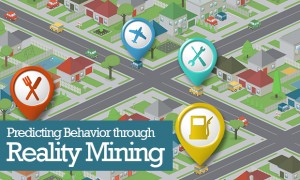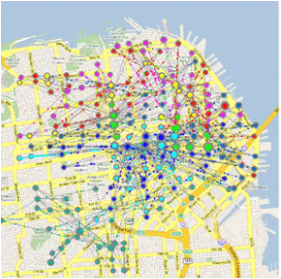Have you heard of Reality Mining? Born out of an MIT academic projet at the turn of the century, Reality Mining is the collection and collating of machine-sensed environmental data through mobile devices with a view to better understand and predict human behaviour and social interactions. In a recent book on the subject called Social Physics: How Good Ideas Spread — The Lessons from a New Science, Alex “Sandy” Pentland, the Toshiba Professor of Media Arts and Sciences and the director of the Human Dynamics Laboratory, shows both how the information is collected and how the data can be interpreted and used in a number of different contexts. In fact, reality mining is the « collection of information generated by everyday objects and the subsequent processing of it » according to Cyborg Antrophology.
 Why will this change our lives? Because it can be used to interpret a huge amount of data on the way we behave, our culture, fashions and even our social problems. For example, when a flu epidemic breaks out in a particular area, a lot of people will search for flu symptoms on Google, make slight changes in their behaviour and call patterns. By tracking these changes it is possible to predict the spread of this illness or eventually any other illness in the world. And of course the mobile phone is both the source of the sensors and the means by which this data is transmitted. So pivotal is the mobile phone in social physics that an open sensing framework called FUNF has been set up to help collect upload and configure data collection.
Why will this change our lives? Because it can be used to interpret a huge amount of data on the way we behave, our culture, fashions and even our social problems. For example, when a flu epidemic breaks out in a particular area, a lot of people will search for flu symptoms on Google, make slight changes in their behaviour and call patterns. By tracking these changes it is possible to predict the spread of this illness or eventually any other illness in the world. And of course the mobile phone is both the source of the sensors and the means by which this data is transmitted. So pivotal is the mobile phone in social physics that an open sensing framework called FUNF has been set up to help collect upload and configure data collection.
What type of data can be collected?
Well it is varied as the table below well illustrates.
Location
WLAN
Accelerometer
Bluetooth
Call log
SMS log
Browser history
Contacts
Installed apps
Screen on/off state
Music/Image/Video file scan
Battery status
And we can expect this list to be extended in the very near future to include information from wearable computing, remote sensors and the internet of things. Notice that all the information collected by the devices is what Pentland calls ‘honest’ data; it is is hard data, less open to interpretation and nuance. It is taken from what people actually do rather than what they say, which is the case for the information collected from social networks. Fed into computers and treated with sophisticated algorithms the data will offer an almost god like view of peoples’ behaviour and interaction, seeing how ideas and activities ebb and flow through society. Such information would be of enormous value to companies that have to manage complex dynamic systems, like transport companies, local authorities and major businesses. The lessons learned from these observations could lead to the more accurate prediction of human behaviour but may also lead to attempts to tweak tune or even control human interactions on a large scale for good or for not so good purposes!
An idea is nothing to sniff at!
There is no doubt that this type of data analysis will be useful to help to understand how people function. That’s why, experiments will be more and more common. In Oregon, a developer Max Odgen has created a project called PortlandSmells. Every citizen of Portland, who wants to be volunteer, has to report what they smell in the cities and upload the information thanks to a system provided by the developer. Thanks to the application, it is possible to locate eventual hazards by the reporting of suspicious smells.
It seems obvious that if everybody respects all the rules, reality mining by interpreting human interactions and data can represent an great advance in understanding how we react and behave.
To go further :
- http://www.businessweek.com/stories/2008-03-24/theres-gold-in-reality-miningbusinessweek-business-news-stock-market-and-financial-advice
- http://www.ehow.com/info_8553327_effects-reality-mining-humans.html
- http://radar.oreilly.com/2008/05/the-results-of-reality-mining.html
- http://social-physics.net/
An interesting take on Reality Mining from future guru Nicolas Carr here

Une réponse à “Reality mining, the technology which will change our lives.”
I think there are many ways of collecting data from people lives. And this is one of the most efficient ways to do it. We are in fact using it more and more to go everywhere, not only because we don’t know the way we sould take, but also because we want more effeciency. For example, we are no longer thinking about the shortest way in great cities but more about where there is less traffic. However, does everyone agree that this data could analysed in the way that personal data is?